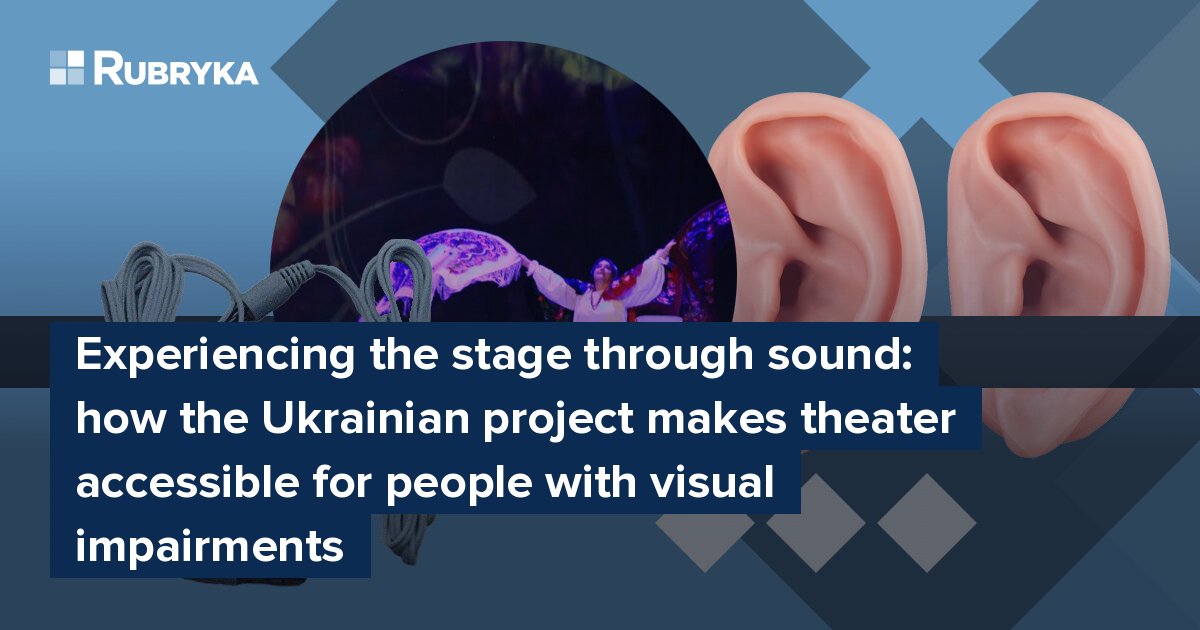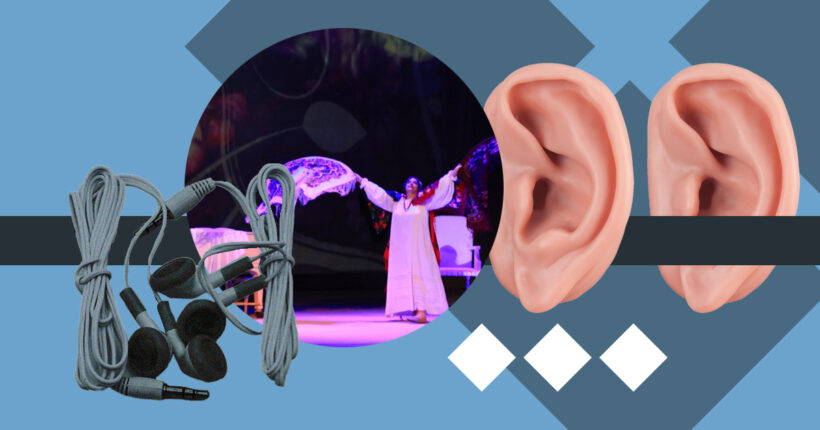
What is the problem?
Theatre is not only a form of art, but during times of war, it can also serve as a therapeutic outlet for Ukrainians. It has always been a medium for expressing emotions and showcasing the beauty and complexity of human existence. Unfortunately, there is a group of individuals who are unable to experience this magical world – those with visual impairments fully.
What is the solution?
Access to culture and art should be granted to every individual as a fundamental human right. As a result, many arts organizations are now actively seeking ways to provide inclusive and accommodating experiences for blind audiences.
Since the beginning of summer, the project "Implementation of audio description service for people with visual impairments in the regional theaters of Vinnytsia, Rivne, and Khmelnytskyi" has been carried out in Ukraine. The initiative was led by the audio description agency "Slovom" and received support from the Ukrainian Cultural Fund. Rubryka recently had the opportunity to speak with the project manager and audio description commentator Liubomyr Pokotyl about how the initiative operates, its relevance, and the development of similar projects.
How does it work?
From sports battles to theatrical performances
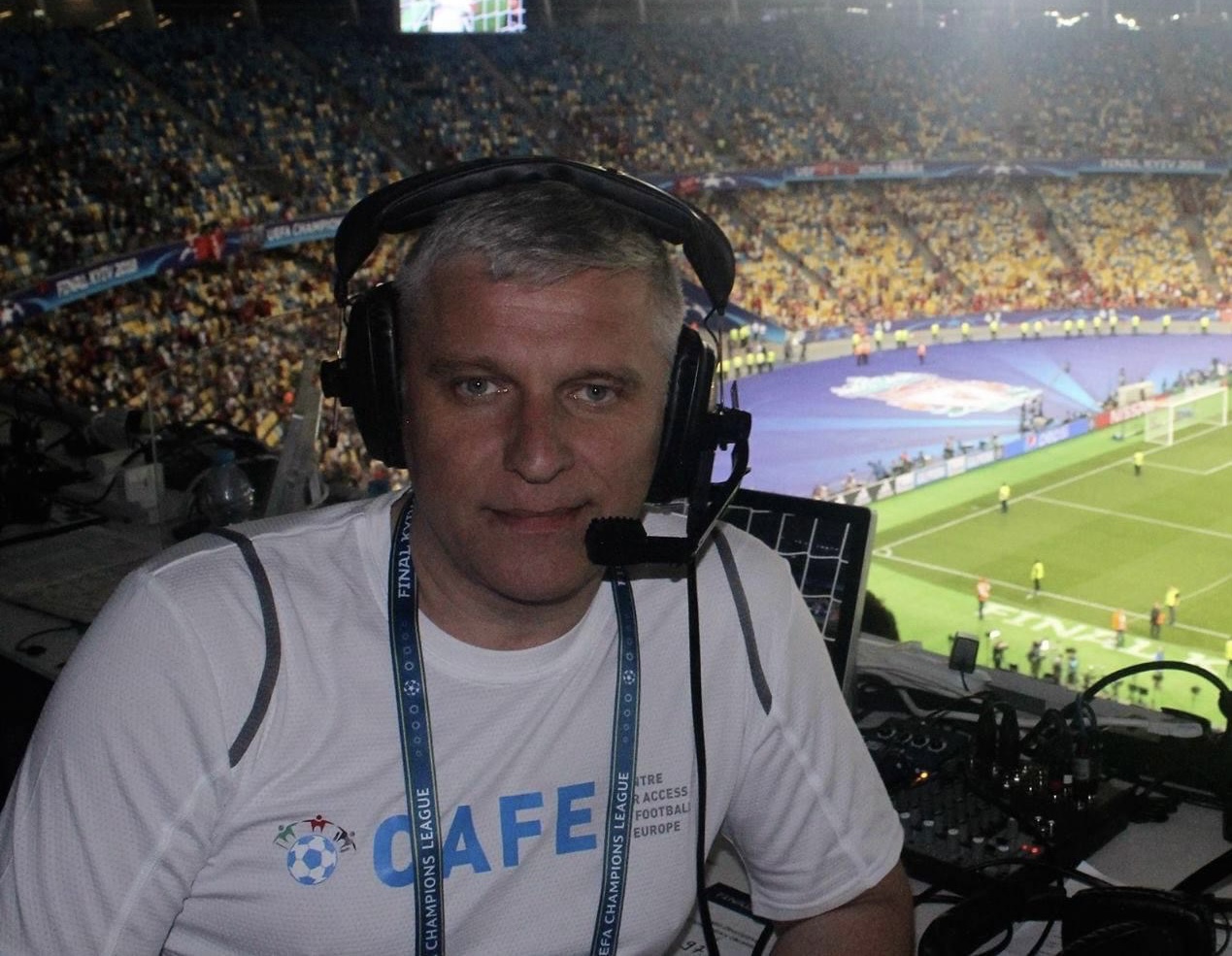
Liubomyr Pokotylo has been making football matches accessible for visually impaired individuals for over a decade
"Slovom," the Audio Description Agency team, has provided services for individuals with visual impairments since 2011. The adaptation of cultural and sports events for blind people began during the preparation for the European Football Championship by Ukraine and Poland. At the time, audio description was first implemented at the stadiums in Kyiv, Kharkiv, Donetsk, and Lviv. Since then, audio description has become a standard offering for fans at major football matches, especially in the capital. Additionally, audio description has been utilized to adapt documentaries, feature films, and other cultural events.
"During this time, we have gained some valuable experience in Ukraine," says Liubomyr Pokotilo, an audio descriptive commentator. "However, we also acknowledge and continue to learn from the experiences of our colleagues in Austria, Great Britain, and other European countries, where the availability of cultural products, particularly through audio description services, is mandated by law. Many theaters, museums, and other cultural institutions in these countries provide audio description services for visually impaired viewers. While the experiences of our foreign colleagues are intriguing, it is the feedback from our users, those who attend the performances, that truly inspires us and encourages us to strive for improvement."
Two years ago, "Slovom" successfully launched a project to provide audio description services in three major capital theaters. With the support of the Ukrainian Cultural Fund, six diverse performances were adapted at the Youth Theater, the Kyiv Opera, and the Pechersk Theater as part of the project "Accessible Theater: Audio Description of Performances for Blind and Visually Impaired Audiences."
This year, the agency's team visited theaters in Rivne, Vinnytsia, and Khmelnytskyi with a similar project. The goal of this initiative is not just to showcase the significance of audio description but also to establish a sustainable and systematic service for visually impaired viewers.
"Regional theaters are participating in this year's project with enthusiastic and prepared management to improve accessibility," Liubomyr Pokotylo says. "This task has been and continues to be of great importance, and there is still much work to be done. It is regrettable that, as a consequence of the war, there will be an unfortunate increase in the number of people who will suffer from vision impairment or loss. Both civilians and military personnel are experiencing injuries and wounds, so we must strive for inclusivity and accessibility in cultural events for all individuals. "
Experiencing the stage through sound
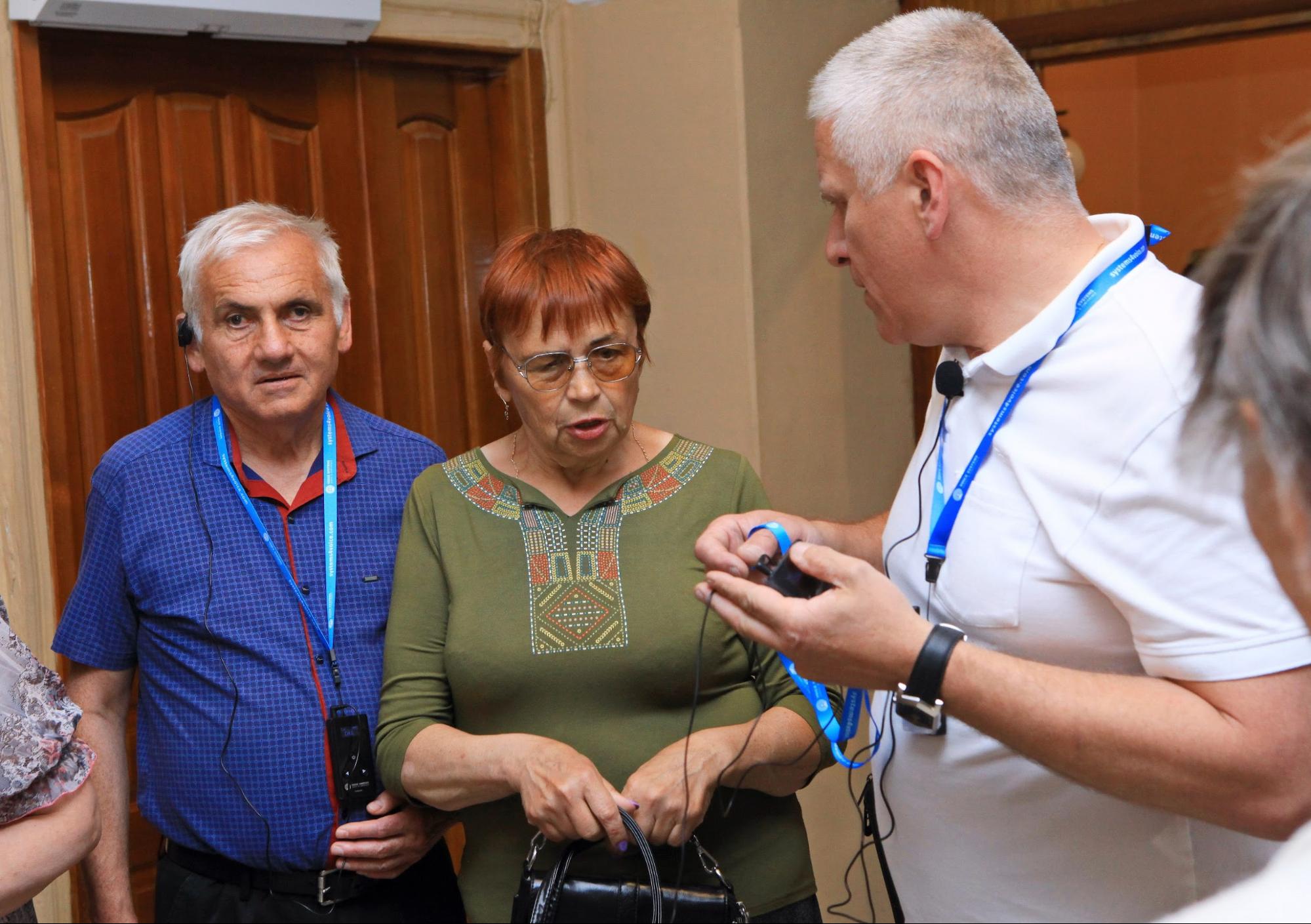
Theater attendees are given headphones before the show begins. Photo by Viktor Kravchenko
Since theatrical art relies heavily on visual cues, providing audio descriptions of performances is crucial for viewers who are partially sighted or blind.
As stated by the directors themselves, unadapted performances cannot be fully experienced through only listening. Visual elements such as set design and silent scenes convey much important information. Often, the most crucial moment of a play is conveyed through silence. In these situations, the only option is to ask someone nearby to explain what is happening on stage. However, this can be disruptive to other audience members, and there is not always someone available to ask. This is where professional audio description comes in, providing brief and concise commentary that does not interfere with listening to the actors. The sound is presented through headphones to prevent disturbance to other viewers.
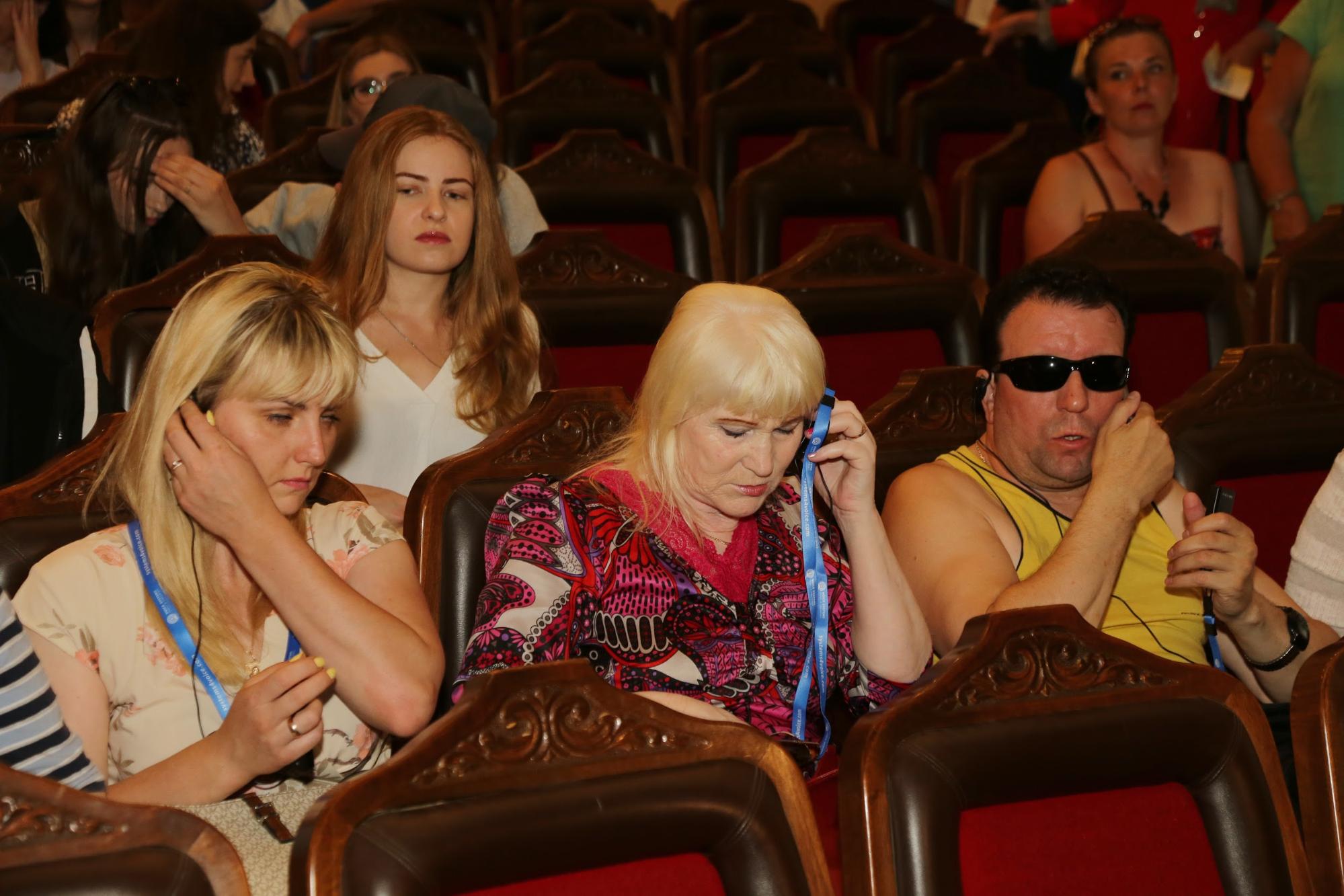
Spectators with receivers in the auditorium. Photo: Anatoly Pokhyliuk
A person with visual impairments is provided with a specialized device – a receiver with a single earpiece. This receiver enables them to hear the commentator's voice throughout the performance in one ear while also listening to the actors' lines on stage through the other.
The commentator must articulate the events taking place on stage, including details such as the performers' costumes, movements, facial expressions, and gestures, as well as the set design, lighting, and color choices made by the director. However, the goal is to provide a comprehensive understanding of the performance for someone who may not be able to experience it visually.
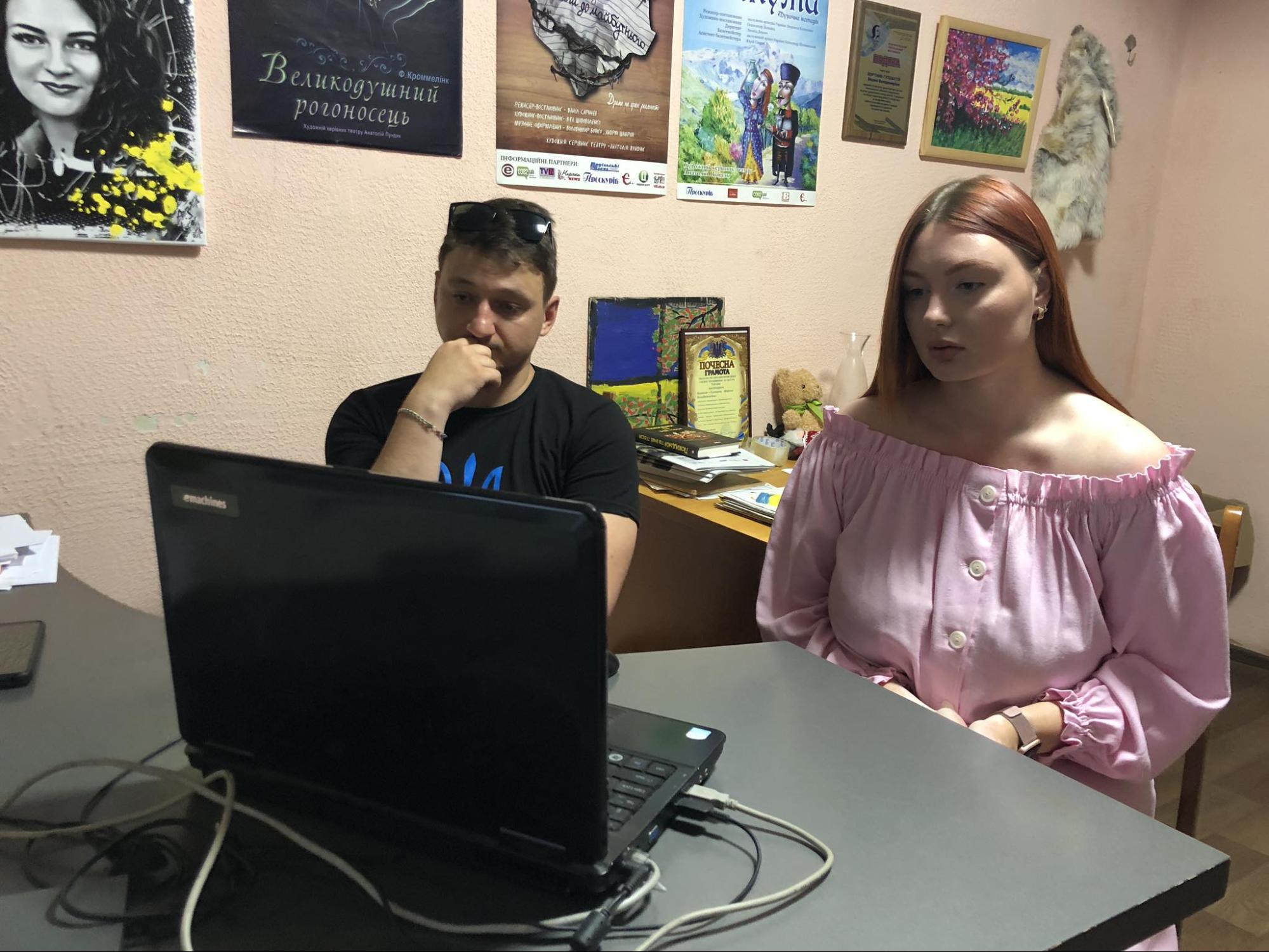
Kateryna Rutska and Oleksandr Yatsyshen, both actors at the Khmelnytskyi Regional Academic Music and Drama Theater named after M. Starytskyi, participated in a performance assessment.
The "Slovom" team collaborates with the theater's creative representatives to develop each performance for several weeks to several months. They craft the scripts, conduct trial readings with blind and partially sighted audience members, and make necessary adjustments.
According to audio description commentator Liubomyr Pokotyl, it's crucial to strike a balance between critical details and minor ones when crafting a text. This is because there is often limited time for explanatory speech. Before beginning the process of writing an audio description, Pokotyl recommends listening to each performance without visuals. This exercise helps determine which information is essential for commentary and description.
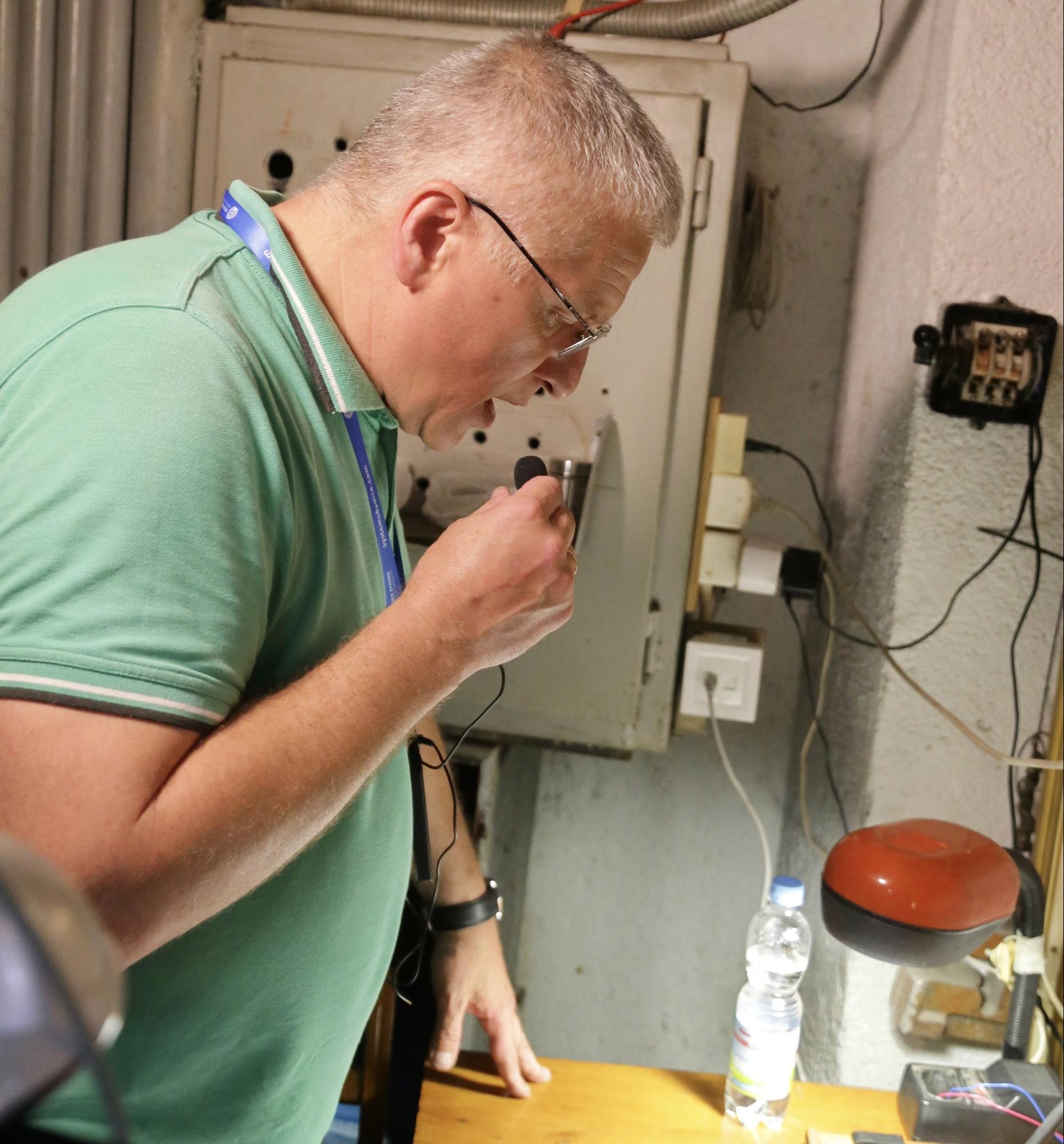
Audio descriptive commentator Liubomyr Pokotylo during work
Next comes the most crucial moment – the live audio description of the performance.
"It would not be an exaggeration to say that an audio description commentator prepares and worries before the start of a performance no less than actors who go on stage," Liubomyr Pokotylo admits.
Typically, the audio description commentary is tailored to the performance since each production is a director's completed masterpiece. However, there are occasions when actors who understand the intricacies of an audio description commentator's role may subtly "work together" with them, incorporating slightly longer pauses for the audience's benefit.
Therefore, through the collaboration of a theater troupe and an audio descriptive commentator, performances are created that are comprehensible and approachable for theater enthusiasts who are unable to experience the stage visually
Theater without barriers
However, the inclusivity of the theater goes beyond just that. The theater teams have also implemented audio description services, conducted accessibility audits, and received training to ensure that visiting theaters is a comfortable and barrier-free experience for those with visual impairments.
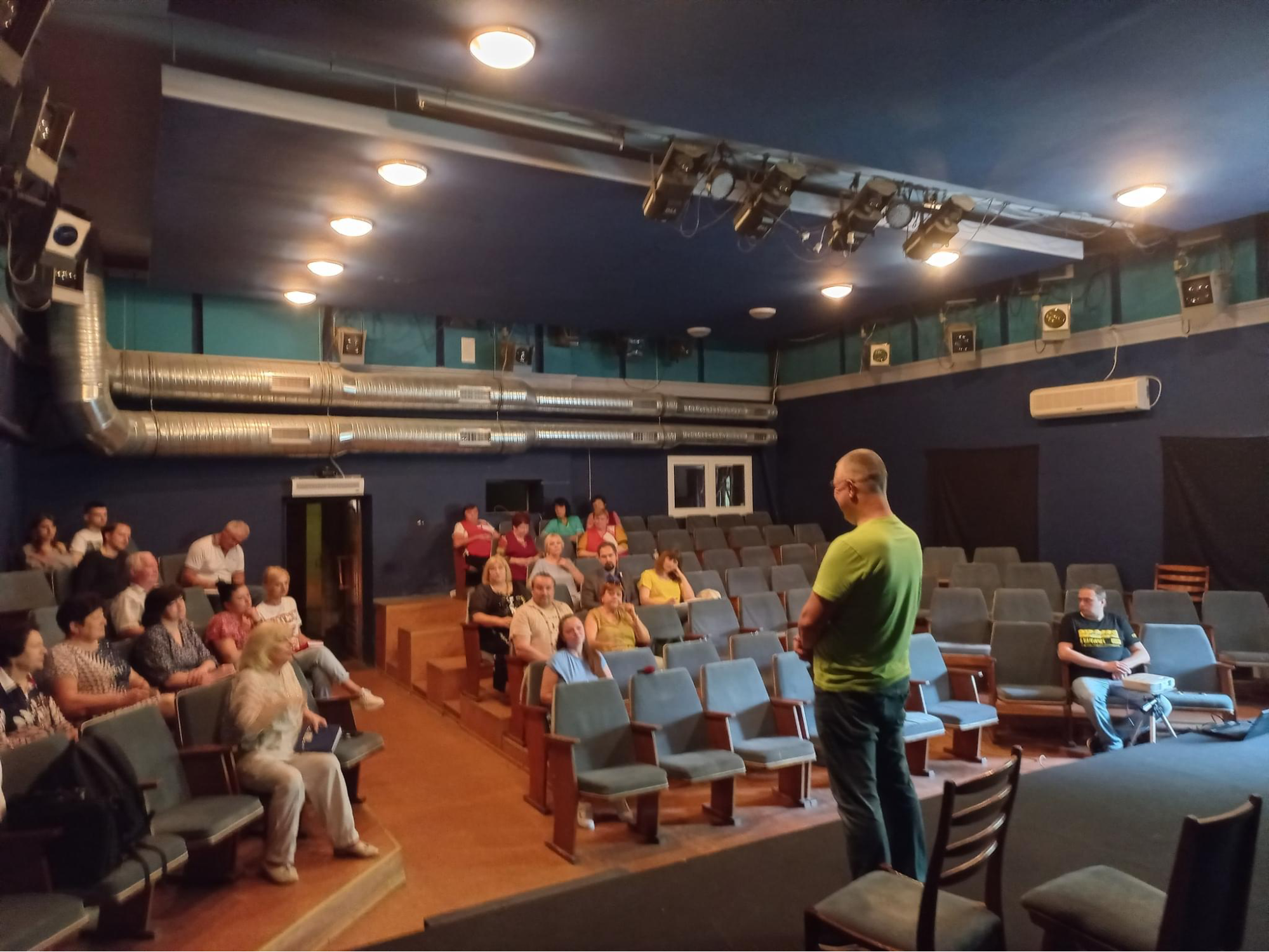
Yevheniy Sviet, a consultant for barrier-free environments, provides training for employees at the Vinnytsia Academic Music and Drama Theater on accessibility.
According to Liubomyr Pokotylo, at the start of the project, Yevheniy Sviet, a consultant specializing in creating accessible environments, held hands-on workshops and training sessions for the staff at each theater. The focus was, in particular, on discussing guidelines for interaction and techniques for assisting visually impaired audience members.
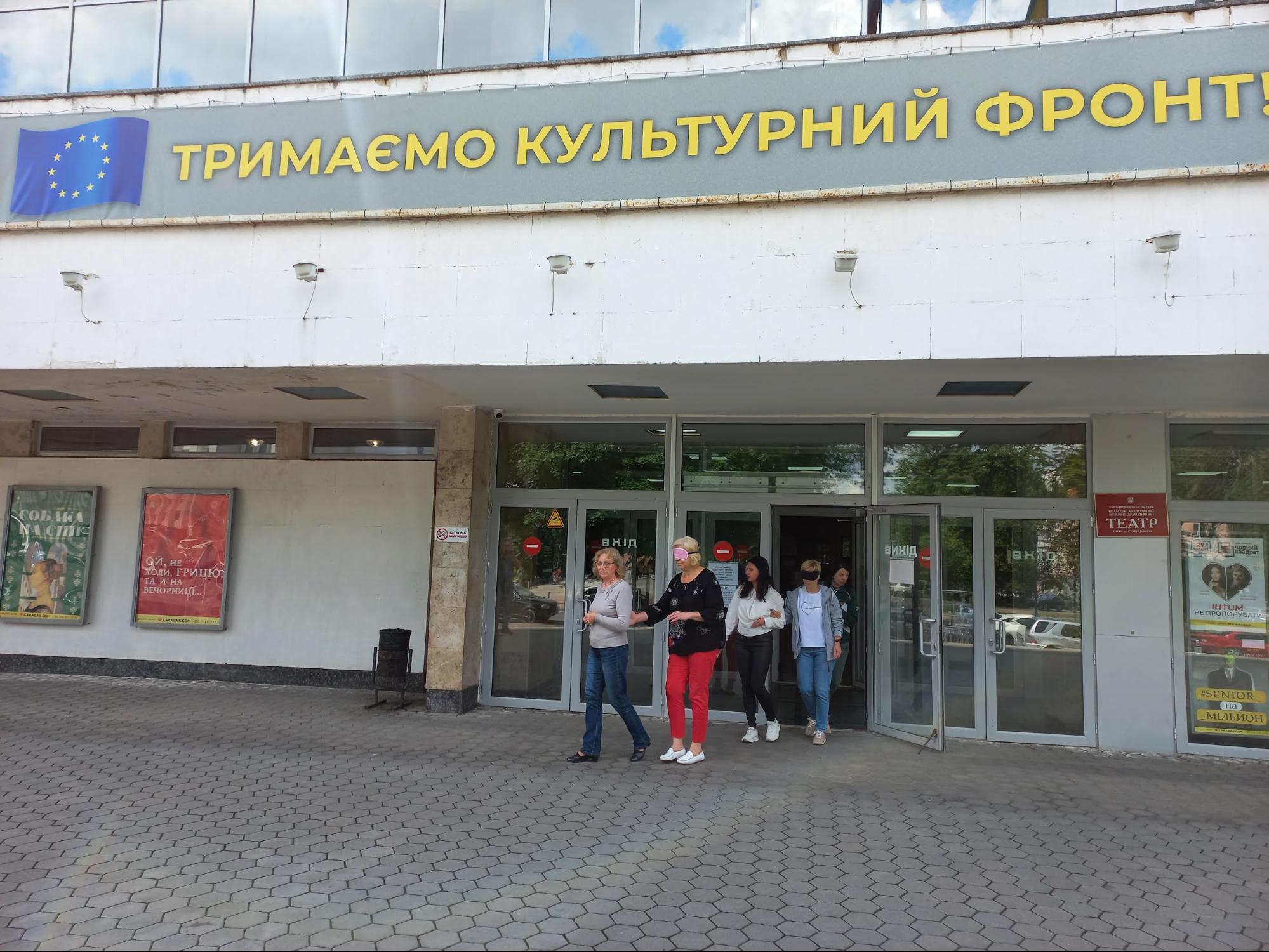
Practical classes for the employees of the Khmelnytskyi Theater, named after Starytskyi
Cultural institution employees were informed via memo about adequately communicating with people with disabilities. The note, titled "Accessible Theater," was written by Yuliia Patlan. Consultants from the agency also assessed the accessibility of the theater's architecture, identified any barriers, and offered guidance on removing them.
Another aspect to consider is digital accessibility, as we are all increasingly reliant on various digital solutions and services daily. Websites and applications can either make services easily accessible or create additional obstacles for those with visual impairments. As part of our project, the "Slovom" team is also focused on making theater websites user-friendly for individuals with visual impairments, allowing them to easily browse the repertoire, plan a visit, and purchase tickets.
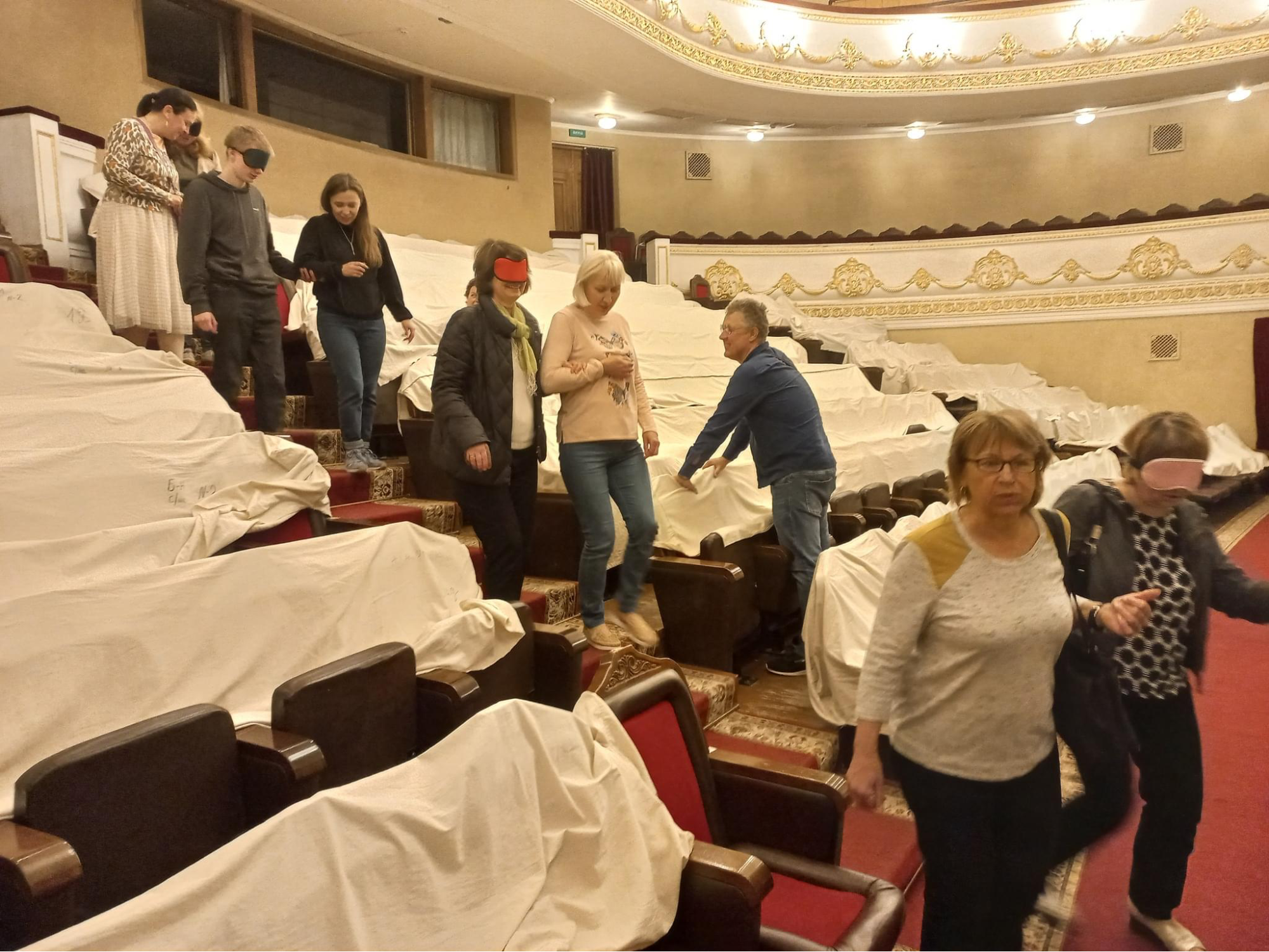
Another service for blind and visually impaired viewers is the exclusive "touch" tour, which offers a behind-the-scenes experience of theaters. This excursion allows participants to step onto the stage and feel the textures of the sets, props, and costumes. Through touch, they can gain a sense of the materials and the spatial atmosphere, enhancing their understanding of the theatrical production.
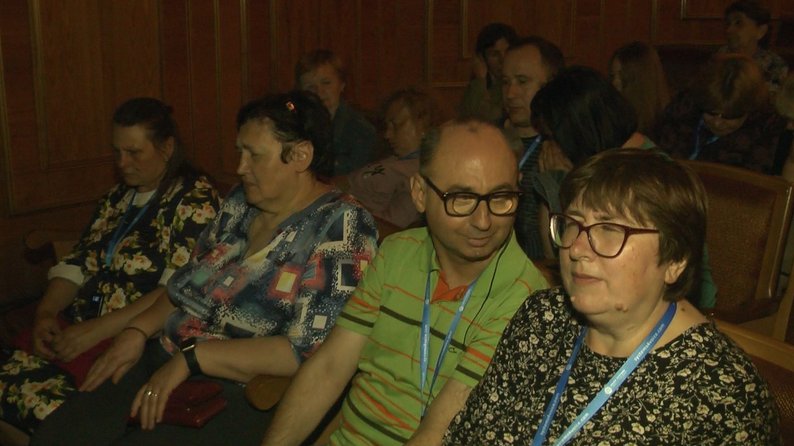
Visually impaired people watch a performance at the Khmelnytskyi Theater
Currently, a total of six diverse theater productions have been equipped with audio descriptions, and 12 inclusive screenings have been successfully conducted, thanks to the collaboration between theater managers, actors, directors, and the project team. The first performances with an audio description commentator have already been staged in each city: the modern play "Kaidashi" in Khmelnytskyi, the drama "Kvitka" (based on the life of Kvitka Tsisyk) in Vinnytsia, and the comedy "Dinner with a Freak" in Rivne.
Everyone, including avid theatre enthusiasts and newcomers to the stage, recognized the benefits of the audio-described performance. Individuals with visual impairments have expressed that the audio description greatly enhances their overall perception of the show, allowing them to feel self-sufficient and fully engaged in the theatrical experience with the rest of the audience. Furthermore, attending the theatre provides a much-needed escape from today's realities, rejuvenates the spirit, and evokes positive emotions.
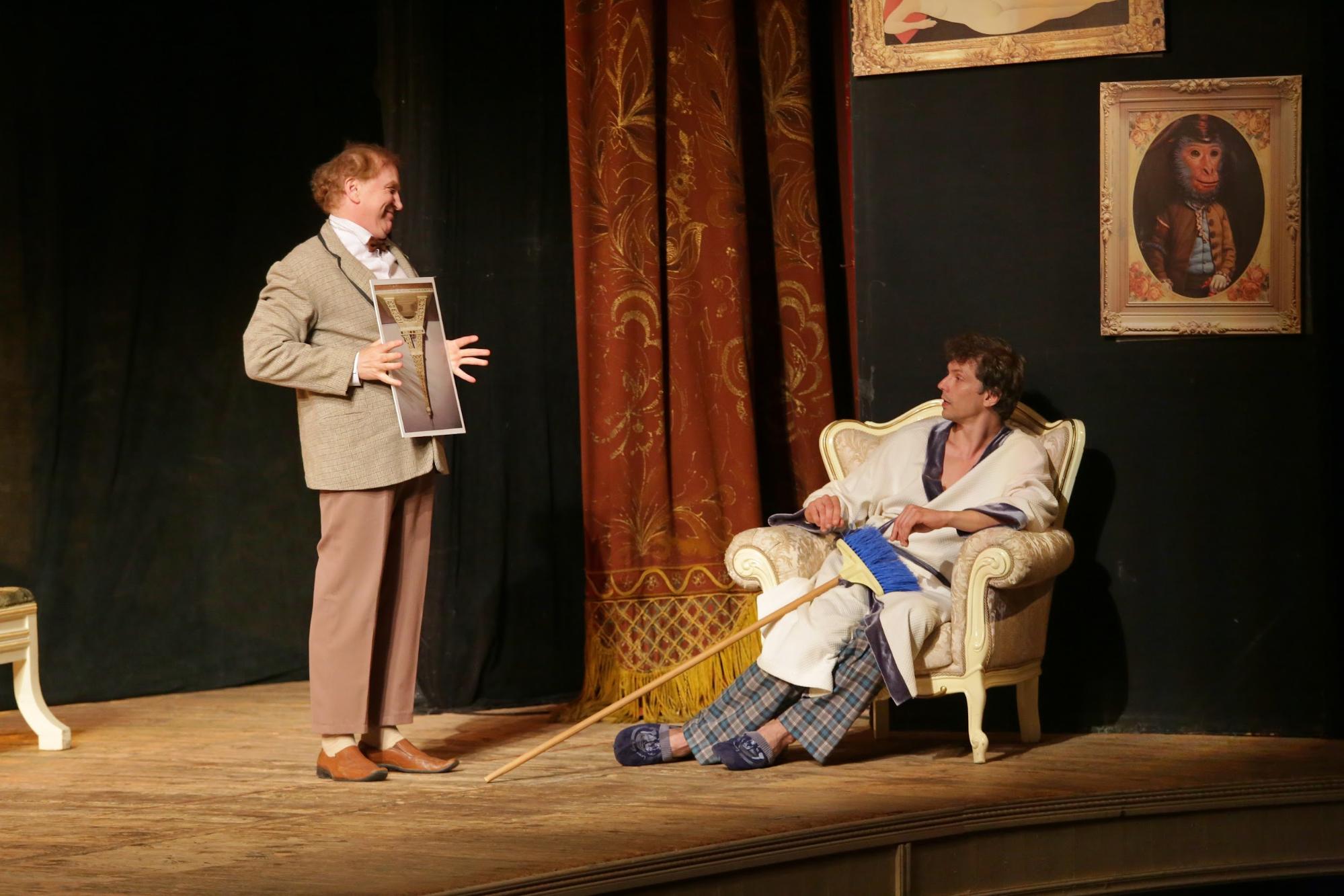
A scene from the play "Dinner with a Freak" at the Rivne Regional Drama and Music Theater. Photo: Anatoly Pokhyliuk
"Following each initial performance, we always gather feedback from our audience members who attended the play. Overall, the responses have been quite positive. However, some suggestions exist, such as for the dialogue to be projected louder when accompanied by music or to provide more details about the characters' appearances. Rest assured, we will be taking all of these comments into consideration," explains Liubomyr Pokotylo, the audio descriptive commentator and project manager.
Right now, individuals with visual impairments can attend performances for free, as per the theaters' wishes. However, the project manager notes that this will no longer be a requirement for the continued use of the audio description service. It will simply be an accessible extra feature at the facility.
Even more helpful solutions!
Slovom, the audio description agency, has a valid belief that simply providing one service is not sufficient to make the theater accessible to those with visual impairments. It is crucial to work systematically in all aspects, including collaborating with public organizations, journalists, and government officials, as well as promoting and enhancing the offered services.
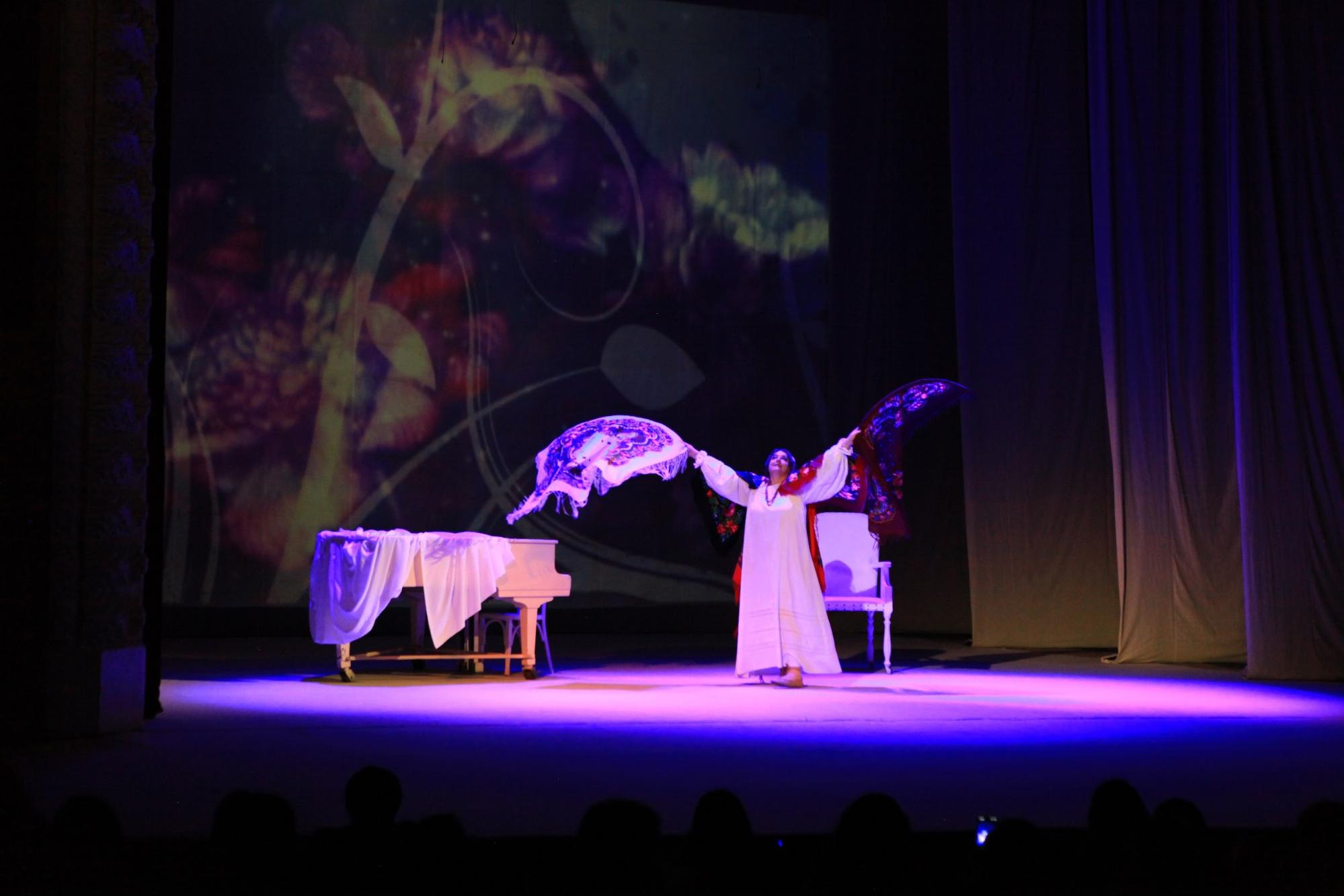
A scene from the play "Kvitka" in the theater named after M. Sadovskyi. Photo: Viktor Kravchenko
"The methods for adapting plays must evolve as well," Liubomyr Pokotylo adds. "Various research examines and explores effective strategies through collaboration and involvement of actual viewers. One such approach suggests incorporating audio description within the characters' dialogue to reduce the necessity for external commentary. There is also considerable effort and guidance in crafting a precise and vivid description, selecting specific vocabulary and adjectives to allow the audience to envision the characters' emotions and attitudes without being given pre-determined conclusions."
By the way, the initiative of the "Slovom" agency is also multi-component.
"Our team is currently dedicated to successfully carrying out all planned tasks in three theaters. In the future, these theaters will be able to prepare performances with audio descriptions regularly and independently. To achieve this, we hold educational workshops where we provide guidance on working with voice accompaniment and teach how to create audio descriptions for performances. Additionally, we document our project experiences, including both successes and mistakes, to share, distribute, and propose its implementation to other theaters in Ukraine," the project's manager says.
Along with producing audio descriptions for performances and training theater staff, the project includes purchasing equipment permanently installed in the theaters. Currently, the project is in the equipment selection phase, specifically for radio transmitters and receivers for the audience. This equipment will ensure a convenient and reliable transmission of sound signals during performances. Thanks to the funding from the Ukrainian Cultural Fund, all three participating theaters will be equipped with this technology.
Newsletter
Digest of the most interesting news: just about the main thing



